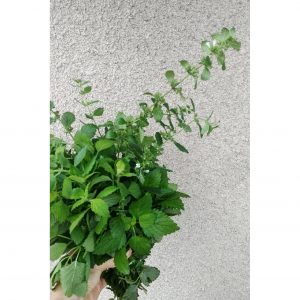Stress needs no introduction. Holding that ball of stress in our stomachs, chests, or minds sends our bodies into emergency mode – maybe you experience it through shifts in appetite, digestion, butterflies in your stomach, mental and physical exhaustion, loss of sleep, increased PMS – as your body struggles to defend itself. Stress is inevitable, and we’ll always live amongst its waves. Rather than resisting and ignoring the shifts stress causes in our bodies, causing more tension, how can we meet stress’ edges and learn instead to soften and support our bodies?
Nervines are herbs that act on the nervous system, either in a relaxing, sedative, or stimulating way. Just like you might turn to coffee as a nervine stimulant, you can look to nervine relaxants to center and soothe throughout the day. Nervine relaxants have ripple effects through the body and its systems as the nervous system is encouraged to calm. They can help us through the day, and set us up for good sleeps later on.
Different herbs have affinities for different organs and systems, meaning there are endless combinations that can focus on your changing individual needs. While working with an herbalist is a powerful way to create your most potent blend, consider some of my favorite nervines while connecting to your body’s needs:
Lemon Balm: A member of the mint family, it’s bright smell is indicative of its volatile oils. A mild antidepressant, lemon balm addresses nervous tension in the stomach and may help dispel anxiety. As a bonus, its uplifting citrus taste makes for an easy to drink cup of tea, and it grows easily in a home garden.
Oatstraw: If you’ve ever said you’re ‘fried’ at the end of the day, meet oatstraw. Oatstraw is a pro at soothing fried and frazzled nerves! Stress can affect the nervous system’s ability to function properly, resulting in that nervous exhaustion and feeling of depletion. As a trophorestorative, oatstraw feeds the nervous system and helps restore function and relaxation.
Skullcap: For many, stress manifests as an inability to escape circular thoughts; in a brain that dwells on problems without coming to conclusions. Maybe you’ve found yourself with that stress eye twitch, those tight shoulders and neck, and trouble sleeping, all of which leave you exhausted. This mental and emotional tension is where skullcap is indicated.
Motherwort: A most prized weed you might find growing wild in your neighbourhood, motherwort encourages the chest to release the tension and anxiety often caught there in the presence of stress. Motherwort can help release heaviness in the chest and ease anxious palpitations.
These herbs are most commonly drunk as teas, infusions (often brewed at high strength, left to steep overnight), and/or taken as tinctures (alcohol extracts of herbs).
The list of nervines is endless – including also the often underrated chamomile (an absolute star for stress related stomach upset), holy basil (relaxing and warming), and lavender. But herbs are extremely multifaceted – the above focuses primarily on the herbs’ ability to support the nervous system, not the entirety of the plants’ complex actions. Working with a herbalist who understands their properties in depth offers the opportunity to blend them in consideration of their relationship to each other and to your specific body!
Before working with herbs, it’s best to consult with your health care provider, especially if pregnant, trying to conceive, or using prescription medication.
Kelly Sprague is a Registered Herbalist working at Two Rivers Health. Click here to book your consultation with her!

